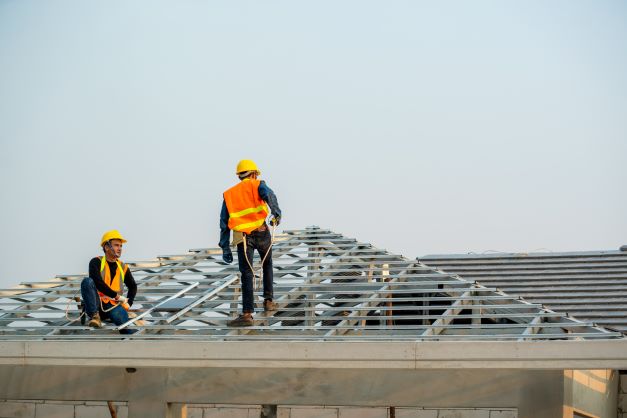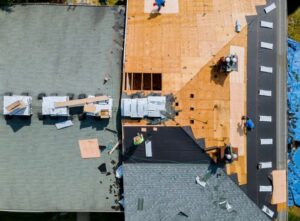
Vital Roofing Services: Residential, Multi-Family Units, and Insurance Claims
Residential Roofing Types
A roof system is so much greater than simply shingles. It’s more than just a protective barrier against rain, snow, hail, and wind. An adequately installed residential roof system provides many functions essential to keeping your home comfortable, safe, and beautiful. Learn about the differences between asphalt shingle roofs, metal roofs, tile roofs, composite materials, and more. Discover what each material does to protect you from the elements and make your home look great.
Asphalt Roofing Shingles
The asphalt shingle roof is one of the most popular roofs in the United States. It accounts for about 90% of commercial roof installations. And while there are many different kinds of shingle products out there, most asphalt shingles fall into three main categories: Colorbon, EPDM rubber membrane, and PVC.
Slate Roofing
A slate roof is one of the most popular options for home improvement projects. Slate roofs are beautiful, weatherproof, and relatively inexpensive. They come in many different styles and colors to match your needs. A slate roof can last anywhere from 25 to 50 years, depending on how well it is maintained. Here are some things you need to know about slate roofs.
Metal Roofing
In the past, metal roofs were used primarily for industrial purposes. Many businesses still use them today. However, durability significantly differs between a traditional shingle roof and metal roofing. Metal roofing is much easier to maintain than a conventional asphalt roof. They don’t require constant cleaning, maintenance, or repairs like a traditional roof. This makes them ideal for residential applications.
Residential Roof Inspections
Need a roof inspection for your brand new home? Our team of roofing experts is ready to help you find the best solution for your needs. From residential to commercial, we offer free estimates and inspections across the United States. Schedule yours now! We’ve got you covered.
Residential Roofing Repairs
Residential Roofing offers high-quality roof repairs and maintenance to homeowners across the United States. Our team of experts is committed to providing our clients with reliable roofing services and exceptional customer care. If you’re looking for a local roofing contractor in Denver, CO, contact us today.
Multi-Family Unit Roofing
At Denver Roofers, we specialize in providing high-quality, affordable roofing solutions for multi-family housing units. Our highly skilled professionals are dedicated to providing superior customer service and workmanship.
We do everything possible to ensure your home is safe and secure during construction. Your property reflects your taste and lifestyle, and we want you to feel comfortable and confident about what goes up on your roof.
We aim to build long-lasting relationships with our customers and strive to exceed expectations at every step.
Roof Replacements
We provide quality roof replacements for multi-family buildings. We are experts in residential roof replacement and provide our clients with a full spectrum of roofing services. Our team includes certified installers, project managers, estimators, and inspectors.
We work closely with architects and engineers to ensure that each job is completed according to code requirements and specifications. Each project is managed from start to finish to ensure client satisfaction.
Preventative Maintenance
Denver Roofers provides preventative maintenance services for multi-family units, including annual inspections and routine cleaning. Our team looks for signs of wear and tear and makes repairs before they become expensive repairs.
We also provide regular maintenance services for commercial properties, such as office buildings, hotels, restaurants, and retail stores. This includes inspecting the roof and performing necessary repairs to keep it safe and functional.
Challenges to Multi-Family Unit Roofing
Roofing projects are often complex, and you want to ensure everything goes smoothly. You don’t want to spend money on materials that aren’t needed or have to spend extra time and energy getting things done correctly. Fortunately, there are ways to avoid some common pitfalls in apartment roofing.
The most important thing to remember about roofing repairs and replacements is that it’s a big undertaking. There are many factors to consider, including the size of the roof, the type of material being used, and how much work must be completed.
One of the biggest challenges in apartment roofing is determining what is wrong with the structure. If you notice damage or leaks happening in multiple places, it could mean something is wrong with the entire roof system. In addition, you might find that the roof is damaged in areas where there isn’t even water leaking out. This can happen because of faulty flashing or shingle nails.
If you discover problems, the next step is figuring out how to fix them. Some roofs require extensive repairs, while others can be patched up. Depending on the extent of the problem, you might need to call in professional roofers to help you figure out the best solution.
You can ensure that your roofing project goes smoothly with a few simple steps. First, you should check the integrity of the existing roofing system. Ensure that the roof is installed correctly and that no parts of the roof are missing. Next, look for signs of deterioration, like cracks or holes in the shingles. Once you identify any issues, you can contact us to discuss your options. We offer a variety of solutions, including roofing repair and roofing replacement.
Understanding Homeowners Insurance Roofing Claims
Understanding how roofing insurance claims work will help you if you have experienced storm damage to your roof. By learning the ins and outs of insurance, you can ensure your contract is clear and practical, reduce delays, receive better roof replacement or repair services, and save money.
While homeowners’ insurance can be confusing, knowing how roofing insurance claims are handled can help you navigate the system smoothly and efficiently.
Types of Roof Damage Covered by Homeowners Insurance
The dwelling coverage portion of your home insurance covers the house structure and includes the roof. This part of your policy typically covers sudden and accidental problems caused by specific events like wind, fire, hail, or the weight of snow on your roof.
You’ll want to review your homeowner’s policy carefully to find out what problems it covers. Some policies cover roof leaks, while others don’t. Some exclude problems that happen gradually over time, and some include wear and tear.
You might also consider buying additional coverage for the rest of your property, called contents coverage. Contents coverage protects your personal belongings inside your house against loss due to theft, fire, vandalism, breakage, or collapse.
Storm Damaged Roof Insurance Claims
If you find yourself dealing with a storm-related claim, you might want to consider replacing the entire roof. However, you could opt for a repair plan if you don’t have the money. But what happens if you only have part of your roof damaged?
In some cases, the lifespan is shortened because of damage, meaning that the portion of the affected roof won’t last as long as it would have without the damage.
For example, if a homeowner had asphalt shingles damaged because of hail strikes, an adjustor would count how many strikes happened in a section to determine how much of the roof was compromised. If too many strikes, the roof lifespan will be significantly impacted, needing to be replaced entirely.
Supplements Roofing Insurance Claims
Most home insurance claims require additional work to complete the repairs. Most homeowner policies include a section called “supplemental payments.” This section lists additional costs such as other living expenses, replacement costs, etc. An insurance provider will pay for these types of things once they receive notice of a loss.
However, it’s not uncommon for insurance providers to leave certain line items off the initial estimate given to the insured. For example, insurance providers often list the total amount needed for labor and materials but don’t mention the actual price per square foot.
Many people think that the supplemental payment covers the entire repair process. They fail to realize that the supplemental payment applies to the repair itself but doesn’t cover any additional costs associated with the project. In other words, if your roofer charges you $1,500 for labor and materials, and you decide to add another $1,200 for a skylight, you’d still owe the same $2,700 for labor and materials even though you added the skylight.
Wind and Hail Damaged Roofing Claims
Home insurance companies in past years had to deal with multiple yearly roof claims. Some of those claims were due to severe weather while aging roofs caused others. Roofing contractors are often unaware of how much their work will cost homeowners because they don’t know what type of roof material is being used. This makes it difficult for insurance adjusters to determine the actual cash value of the property.
To combat this, many home insurance companies have implemented different coverage levels — called “wind and hail damage” (WHD), “replacement value” (RV), and “actual cash value plus depreciation” (ACV + D) — for wind and hail damage versus roof damage from other causes such as fire, theft, vandalism, and tree/pole falls. Your insurance reimbursement will be determined by the depreciated value (not the original price paid) of the roof at the date of the damage. You might find that you can buy only “Actual Cash Value” coverage for wind or hail damage if your roof isn’t old enough to qualify for Replacement Value coverage.
Understanding The Roofing Repair Process
The adjuster inspects your home and determines what repairs are necessary. He or she will go over everything with you, including the cost estimate and the timeline for completion. You’ll know exactly how much it costs and how long it will take to complete the job. If there are any additional questions, the adjuster will answer them.
You’ll want to ensure you understand all the job details before signing off on anything. This includes knowing what materials will be used, where they came from, and what warranties apply. You don’t want to sign off on something without understanding every project detail.
Schedule a Roof Inspection
As always, safety is first, especially during storms. Contact a trusted, professional roofer immediately if you notice any storm damage or water intrusion into your home. Denver Roofers will ensure your roof is adequately repaired or replaced, installed correctly, and meets building codes. Contact us today at 720-443-4202.



